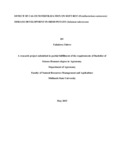Please use this identifier to cite or link to this item:
https://cris.library.msu.ac.zw//handle/11408/2469| Title: | Effect of calcium fertilization on soft rot (pectobacterium carotovora) disease development in irish potato (solanum tuberosum) | Authors: | Tuhwe, Tafadzwa | Keywords: | Irish potato Potato production |
Issue Date: | May-2015 | Publisher: | Midlands State University | Abstract: | Potato production is being affected by many bacterial and fungal diseases hence most farmers incur heavy pre and post-harvest losses. Among the bacterial diseases soft rot is one of the most severe disease. Soft rot is a potato disease caused by bacteria called Pectobacterium carotovora. lt is a seed borne disease and it is difficult to control. The research focuses on increasing resistance of potato to soft rot disease. The experiment was conducted at Africa University campus during the 2013/2014 season. A 3*4 plus control factorial experiment in a randomized complete block design with three replications was carried out in the field. Potato varieties and different calcium sources were the two blocking factors used. The treatments were calcium nitrate (19%ca), calcium chloride (36%ca), and calcium sulphate (22% ca). The control had no calcium. Sprouted tubers of Amethyst, Mondial and BP1 were inoculated with bacterial soft rot solution and then the inoculated tubers were planted with different calcium fertilizers. All the calcium fertilizers were applied basally. Soft rot incidences and severity was significantly low (P<0.05) in treatments treated with calcium with calcium chloride having the least incidence and severity. Calcium also increased tuber number with calcium chloride having the highest yield since disease incidence and severity was low. Amethyst and BP1 proved to have lower resistance to incidence and severity of soft rot disease compared to Mondial which proved to be resistance. This study concluded that calcium chloride reduce soft rot disease incidence and severity in potato. Farmers facing the problem of soft rot can use calcium chloride as a basal fertilizer as it has proved to be effective in controlling soft rot bacteria in potatoes. | URI: | http://hdl.handle.net/11408/2469 |
| Appears in Collections: | Bsc Agronomy Honours Degree |
Show full item record
Page view(s)
292
checked on Jan 29, 2026
Download(s)
138
checked on Jan 29, 2026
Google ScholarTM
Check
Items in MSUIR are protected by copyright, with all rights reserved, unless otherwise indicated.




